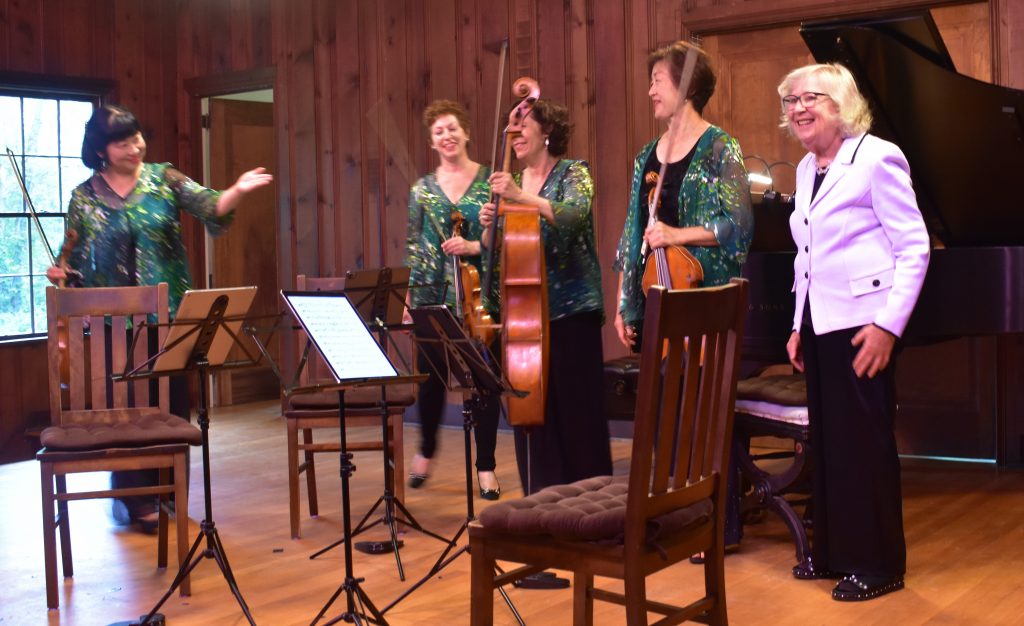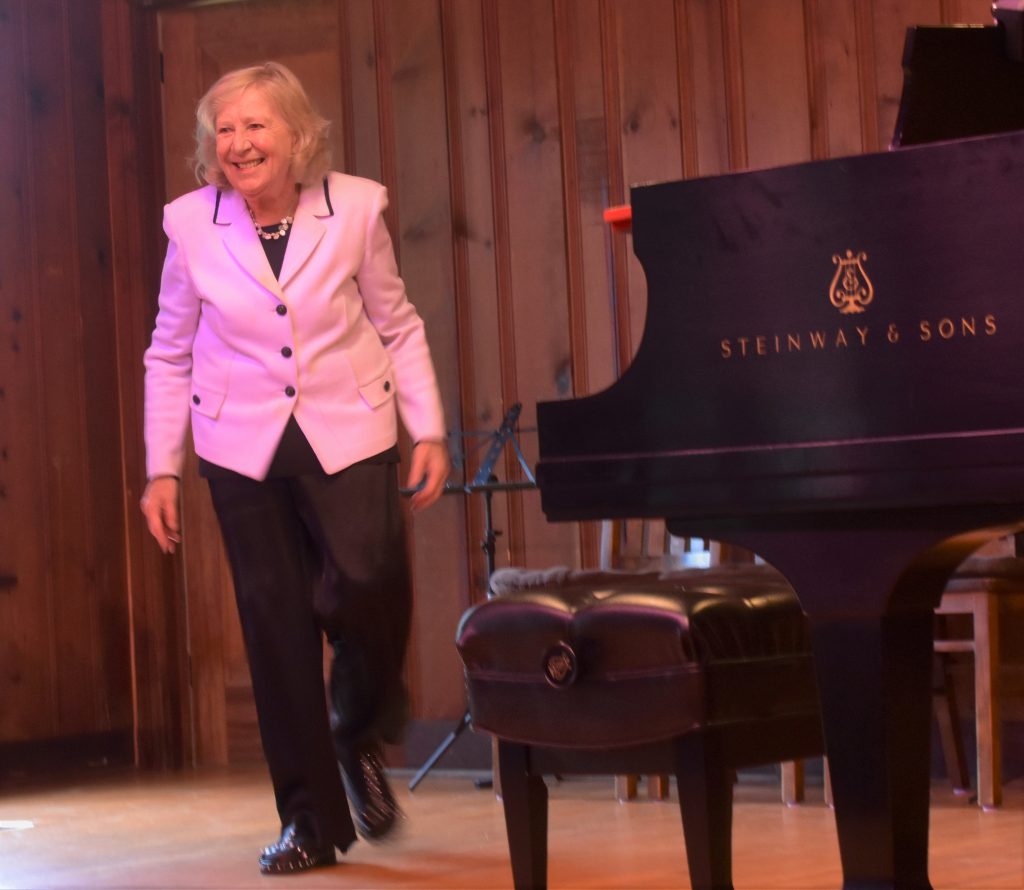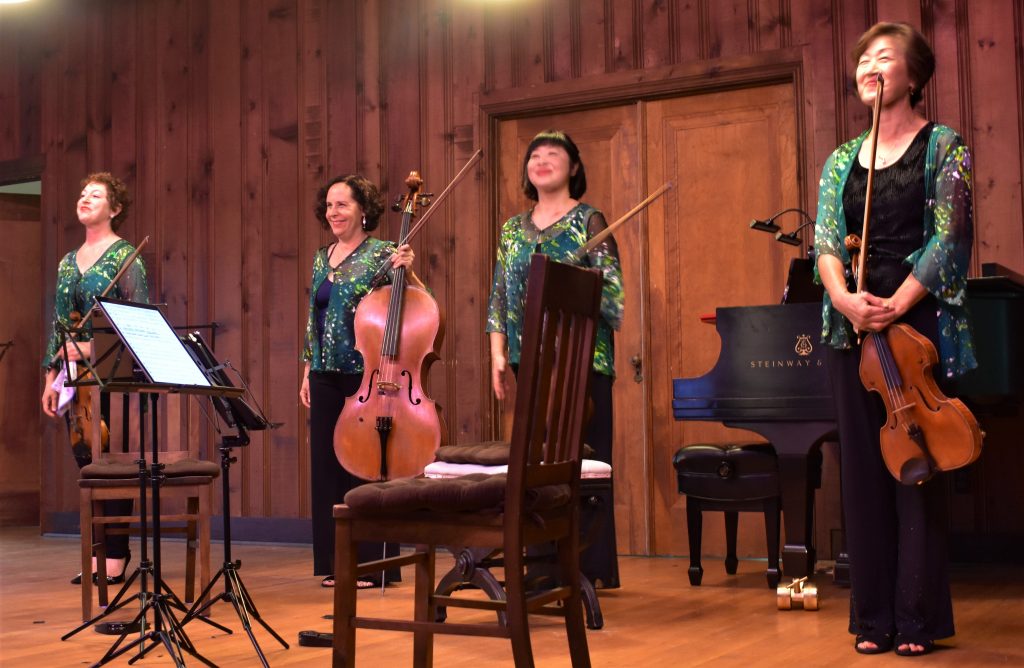
by Kevin T McEneaney
Misty weather from Ireland’s Wicklow Hills magically drifted over Falls Village, CT, last Sunday supplying atmospherics complimentary to Amy Marcy Cheney Beach’s romantic inclination.
As prelude, pianist Ursula Oppens played two excerpts from Fanny Mendelssohn Hensel’s calendrical cycle Das Jar (1841) which was inspired by her tour of Italy two years earlier. Each month receives a painterly portrait of the month’s characteristic atmosphere followed by a Chorale Postlude.
Oppens chose the two longest portraits, “April” and “December,” both favorites of mine. In April we feel the flowers receiving those spring showers that land pit-pat on leaves, drenching them for May bloom as they become satiate with water that tastes like wine to them. In November we hear leaves changing to melancholy brown and drifting down earthward to their inevitable demise. This dialectic foreshadowed what was to come.

Wolfgang Amadeus Mozart’s String Quartet in B flat major, K.589, nicknamed “Prussian” (May 1790) because it was once assumed that he had been commissioned and been paid for them by the Prussian monarch in Potsdam, but contemporary biographies doubt that he was ever commissioned and grudgingly admit that Mozart may have been scantly paid, did not acquire the court post he had hoped for, and was morosely disappointed in the trip, perhaps retuning home in debt. What had happened is not clear, but we have this graceful and lively quartet played by the Cassatt Quartet.
The opening Allegro with its energetic triple meter in the fingers of first violinist Muneko Otani (playing a 1770 J. B. Guadagnini of Parma violin) captured the lyrical rapture of Spring. Ah Ling Neu on viola supplemented Spring ambiance with trees exfoliating, yet the cello grouches about the inconvenience of being “wet” as the second violin in the hands of Jennifer Leshnower (on a 1655 Jacobus Stainer violin) attempts to patch things up in a more agreeable mood.
In the following Larghetto cellist Elizabeth Anderson airily sailed in with rich upper register, coaxing an entrancing cantabile melody, wherein I could “smell” the joy of Spring, yet after this moment in the sun, the role of the cello fades to a more modest ensemble supporting role. The short bubbling phrases of the Menueto elicit the sound of water dancing over rocks and rills. An ebullient sonata-rondo gathers all instruments into a joyous acclamation of the virtues of Spring.

After Intermission the Cassatt Quartet, all attired in uniforms of floral green, performed Piano Quartet in F sharp minor, Op. 67 (1907) by Amy Marcy Cheney Beach (1867-1944) who made a successful debut as a pianist at the age of sixteen. Two years later she married Dr. Henry Beach who forbade her to play in public, allowing her to play but twice a year for charity events. Her Gaelic (Irish) Symphony was the first symphony composed and published by an American woman. It premiered October 30, 1896, performed by the Boston Symphony with acclamation. This piano quintet was, during her lifetime, her most played work.
This quintet is clearly in the footsteps of Johannes Brahms: its moody chromatic melody, often abrupt lyrical contrasts, quick key changes and, above all, cloyingly lush texture. In fact, it presents itself as a sequel to the last movement of Brahms noted piano quintet (which I reviewed two days ago as played with furious excitement by the Sherman Ensemble).
The opening Adagio-Allegro remains engaging in its languorous melancholy; I could not identify with the overly sentimental and lugubrious Adagio that followed; the opening of the concluding Allegro sounded as if it was moving into new modernistic territory, yet the rapid Presto Finale tied back to the opening Adagio, as if we had arrived back home where we first started from. This nostalgic, Celtic perception of time (perennially illustrated in Celtic folk tunes), as a closed circle of repetition, felt retro-claustrophobic to me.
The November melancholy of Gaelic self-pity born out of humiliating subjugation is now a relic of history past. The Beach Piano Quintet achieved impressive ferocity in the bowing of Muneko Otani and seasoned eloquence under the liquid fingers of Ursula Oppens, yet this quintet remains but historic, academic curiosity rather than immortal monument.
This was the last concert of Music Mountain’s 2021 season.